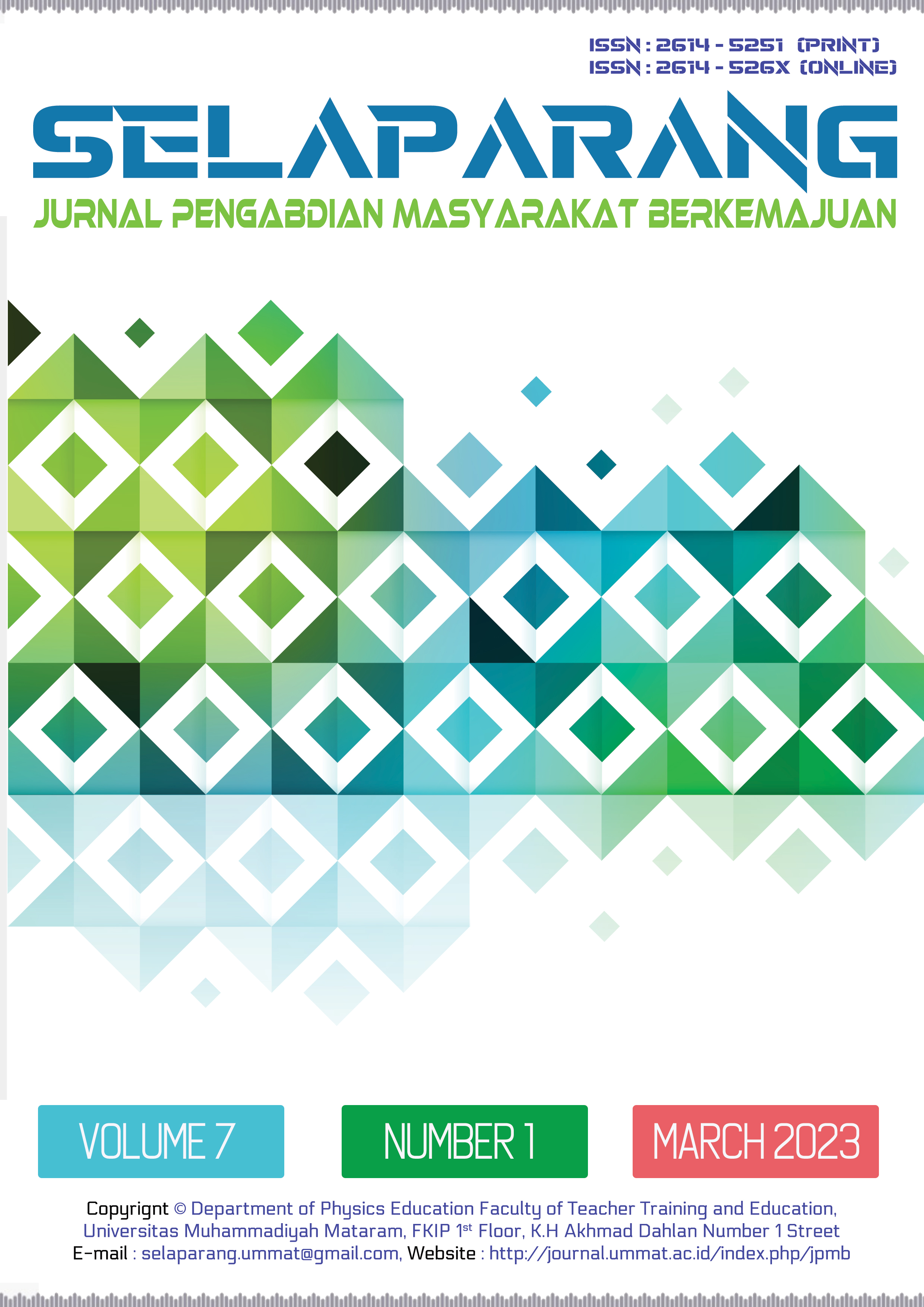IMPLEMENTASI TEKNOLOGI BIOINTENSIF DALAM RANGKA MENINGKATKAN KESEHATAN TANAMAN DAN MENEKAN RESIDU PESTISIDA PADA PRODUK HORTIKULTURA DI DESA NGADISARI - PROBOLINGGO
DOI:
https://doi.org/10.31764/jpmb.v7i1.13312Keywords:
organic, training, extension, fertilizer, appropriateAbstract
ABSTRAK
Desa Ngadisari – Kabupaten Probolinggo merupakan sentra produksi hortikultura di Jawa Timur. Komoditas unggulan di desa ini antara lain adalah kentang, daun bawang, kubis, dan tanaman hortikultura lainnya. Dalam proses budidaya, petani menghadapi serangan organisme pengganggu tanaman dari golongan patogen. Saat ini masalah tersebut diatasi dengan pestisida kimia sintetik. Namun demikian teknik tersebut dikeluhkan semakin mahal dan kurang efektif. Fenomena tersebut merupakan kendala yang dialami oleh petani tanaman hortikultura yang merupakan mitra pada program pengabdian kepada masyarakat ini. Secara umum masalah masyarakat mitra yaitu: (i) serangan organisme pengganggu tanaman yang menurunkan hasil produksi, (ii) belum memahami teknik budidaya sesuai good agricultural practices, dan (iii) belum memahami aplikasi praktis teknologi biointensif. Untuk mengatasi masalah tersebut telah dilakukan upaya dalam bentuk seminar, penyuluhan, dan pelatihan terkait implementasi teknologi biointensif dalam bentuk pembuatan dan aplikasi pupuk organik. Kegiatan dibagi menjadi beberapa aktivitas, yaitu tahap persiapan dan sosialisasi program, tahap pelaksanaan, tahap evaluasi, dan tahap penyusunan program lanjutan. Dari kegiatan ini diketahui petani mendapatkan keterampilan tambahan terkait produksi pupuk organik yang benar, dan memiliki motivasi yang lebih tinggi untuk menerapkan proses budidaya tanaman secara sehat. Melalui peningkatan keterampilan dan motivasi tersebut, diharapkan pada masa yang akan datang produksi pertanian di Desa Ngadisari dapat meningkat dan tingkat residu pestisidanya dapat menurun.
Â
Kata kunci: organic; pelatihan; penyuluhan; pupuk; tepat guna
Â
ABSTRACT
Horticultural products are produced at Ngadisari Village in East Java's Probolinggo Regency. This village relies heavily on selling agricultural products like potatoes, spring onions, cabbage, and other vegetables. When cultivating crops, farmers often encounter pest problem. In order to address this issue, synthetic chemical pesticides are currently employed. Unfortunately, this approach has been panned for being costly. Below are some of the big concerns of the partner community: (i) reduced yields due to pest attacks, (ii) not knowing how to grow using good agricultural practices, and (iii) not knowing how to put bio-intensive technologies to use in the field. Seminar, extension, and training related to bio-intensive technologies' production of organic fertilizer have been conducted to address this issue. Activities are subdivided into various steps, such as planning, executing the plan, and collecting feedback. As a result of participating in this activity, farmers gain knowledge and motivation to produce plants more sustainably, and they are better able to produce organic fertilizers. In the long run, this approach will decrease pesticide residues and boost agricultural production.
Â
Keywords: organic; training; extension; fertilizer; appropriate
References
Aker J. C. 2011. Dial “A†for agriculture: a review of information and communication technologies for agricultural extension in developing countries. Agricultural economics. 42(6):631-647. doi: 10.1111/j.1574-0862.2011.00545.x.
Apata T., Apata O., Igbalajobi O., Awoniyi S. 2010. Determinants of rural poverty in Nigeria: Evidence from small holder farmers in South-western, Nigeria. Journal of Science and Technology Education Research. 1(4):85-91.
Babul B. B. 2022. Analisis kondisi sosial ekonomi masyarakat Suku Tengger di Desa Ngadisari Kecamatan Sukapura Kabupaten Probolinggo. Iqtishodiyah: Jurnal Ekonomi dan Bisnis Islam. 8(2):98-105.
Balogh J. C., Anderson J. L. 2020. Environmental impacts of turfgrass pesticides. Golf Course Management & Construction.221-353.
Darmaludin D., Suwasono S., Muljawan R. E. 2012. Peranan penyuluh pertanian dalam penguatan usahatani bawang daun di Kecamatan Sukapura Kabupaten Probolinggo. Buana Sains. 12(1):71-80. doi: 10.33366 /bs.v12i1.292.
de Graaff M.-A., Hornslein N., Throop H. L., Kardol P., van Diepen L. T. 2019. Effects of agricultural intensification on soil biodiversity and implications for ecosystem functioning: a meta-analysis. Advances in Agronomy. 155:1-44. doi: 10.1016/bs.agron.2019.01.001.
Hendrickson J. A., Hu C., Aitken S. L., Beyda N. 2019. Antifungal resistance: a concerning trend for the present and future. Current Infectious Disease Reports. 21(12):1-8. doi: 10.1007/ s11908-019-0702-9.
Manfre C., Rubin D., Allen A., Summerfield G., Colverson K., Akeredolu M. 2013. Reducing the gender gap in agricultural extension and advisory services: How to find the best fit for men and women farmers. Meas Brief. 2:1-10.
Pradana A. P., Hoesain M., Asyiah I. N., Adiwena M., Budiman A., Yousif A. I. A. 2022. Biocontrol of root-knot nematode Meloidogyne incognita in arabica coffee seedling by using fortified bacterial consortium. Coffee Science. 17:e172063. doi: 10.25186/.v17i.2063.
Rege A., Lee J. S. H. 2022. State-led agricultural subsidies drive monoculture cultivar cashew expansion in northern Western Ghats, India. PloS one. 17(6):e0269092. doi: 10.1371/ journal.pone.0269092.
Rich S. R., Komar S., Schilling B., Tomas S. R., Carleo J., Colucci S. J. 2011. Meeting extension programming needs with technology: A case study of agritourism webinars. Journal of Extension. 49(6):6FEA4.
Salazar C., Rand J. 2020. Pesticide use, production risk and shocks. The case of rice producers in Vietnam. Journal of Environmental Management. 253:109705. doi: 10.1016/j.jenvman. 2019.109705.
Sasongko R. W. D. 2014. Pengembangan Desa Wisata Tengger Jakad Media Publishing.
Sharma A., Kumar V., Shahzad B., Tanveer M., Sidhu G. P. S., Handa N., Kohli S. K., Yadav P., Bali A. S., Parihar R. D. 2019. Worldwide pesticide usage and its impacts on ecosystem. SN Applied Sciences. 1(11):1-16. doi: 10.1007/s42452-019-1485-1.
Warra A. A., Prasad M. N. V. 2020. African perspective of chemical usage in agriculture and horticulture—their impact on human health and environment. Di dalam: M. N. V. Prasad, editor. Agrochemicals Detection, Treatment and Remediation. Elsevier. hlm 401-436.
Zhang W., Cao G., Li X., Zhang H., Wang C., Liu Q., Chen X., Cui Z., Shen J., Jiang R. 2016. Closing yield gaps in China by empowering smallholder farmers. Nature. 537(7622):671-674. doi: 10.1038/nature19368.
Downloads
Published
Issue
Section
License
The copyright of the received article shall be assigned to the journal as the publisher of the journal. The intended copyright includes the right to publish the article in various forms (including reprints). The journal maintains the publishing rights to the published articles.

Selaparang : Jurnal Pengabdian Masyarakat Berkemajuan is licensed under a Creative Commons Attribution-ShareAlike 4.0 International License.

